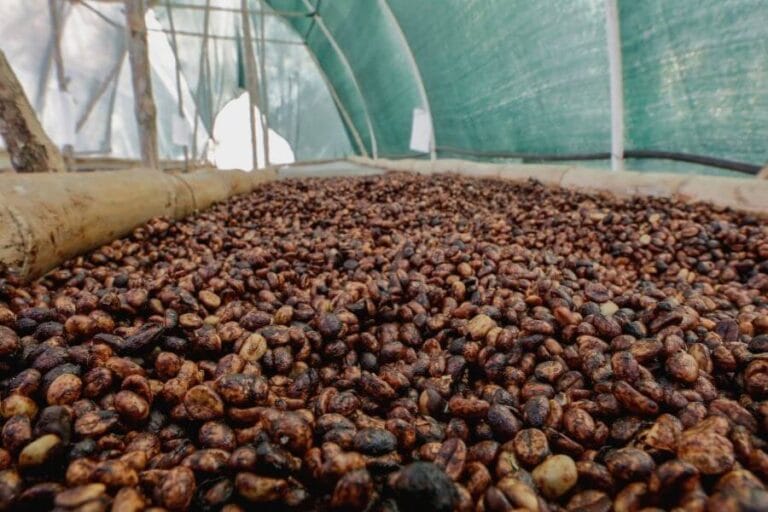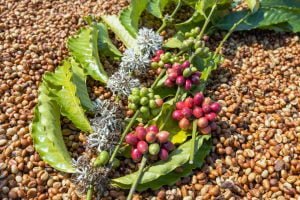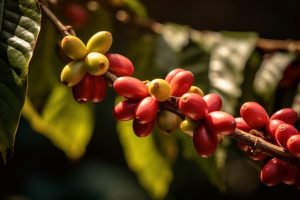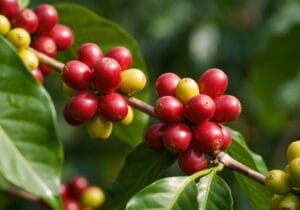Honey process coffee is a quirky, sweet method that keeps some gooey mucilage on the beans while they dry — kind of like leaving frosting on a cupcake. It initially popped up in Brazil in the ’90s and has dazzled taste buds ever since! Unlike the washed method (where everything gets scrubbed clean), honey coffee marries the best of both washed and natural styles, serving up a lively, syrupy flavor. Stick around for more surprising coffee adventures!
Key Takeaways
- Honey process coffee involves depulping cherries while retaining some mucilage, enhancing sweetness and flavor complexity.
- It originated in Brazil and became popular in Costa Rica, known for its specialty status.
- The method features a combination of syrupy sweetness and bright acidity, with flavor notes like honey and apricot.
- Unlike washed coffee, honey processing allows for slower drying, influencing the final flavor profile.
- It requires skilled handling to prevent spoilage, offering a unique tasting experience compared to other processing methods.
Definition and Origin of Honey Process Coffee
Regarding coffee, you might think everything is just brewed like your morning cup, but there’s so much more going on behind the scenes!
Take honey process coffee, for example. It’s not just a snazzy name for coffee with a side of honey (though that’d be delightful). This method means the outer skin of coffee cherries is removed, while some of that sticky mucilage—yes, the same stuff that sounds like a failed science experiment—stays on during drying. This high sugar concentration in mucilage contributes to the distinct flavor profiles found in honey process coffee.
It’s like the cherry’s wearing a messy sweater while it dries in the sun! The roots of this process trace back to Brazil in the ’90s and really took off in Costa Rica—talk about a sticky situation turned specialty!
Processing Steps in Honey Method
Harvesting the perfect coffee cherry is like trying to find the one good avocado in a grocery store; it requires precision and a bit of luck!
To begin, the ripe cherries are handpicked, ensuring only the best of the bunch make it to processing.
Handpicking the ripest cherries is key to ensuring only the finest flavors make their way to your cup!
But wait—enter the depulping machine! This nifty device removes the skin while leaving sweet mucilage on those honey processed coffee beans.
Next comes fermentation, lasting 1 to 3 days, where all that stickiness works its magic on flavor.
Then, into the sun for drying—talk about a sun bath!
Ultimately, milling finishes the process, prepping these beans for roasting.
Who knew coffee was such a diva? But hey, that’s what makes it delicious!
Differences From Other Coffee Processing Methods
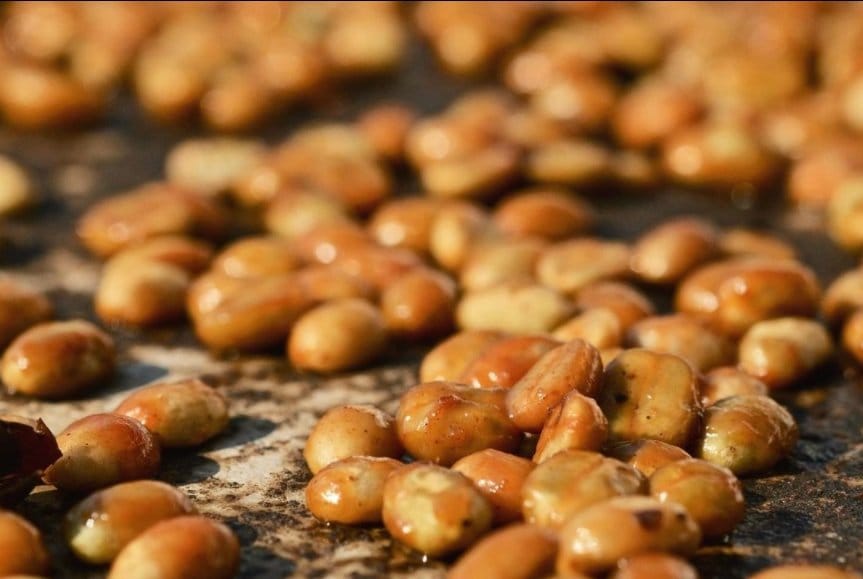
While it’s easy to think coffee processing is just a straightforward task, the differences between honey processing and other methods can feel like maneuvering through a maze—where one wrong turn leads to a muddy cup instead of liquid gold!
Honey processed coffee for sale stands out because it’s a hybrid; it keeps some juicy mucilage on the beans, unlike washed coffee, which scrubs it all off.
This sticky situation means a slower drying time—a bit like waiting for a pizza delivery when you’re starving!
And don’t forget, the skill required is no joke! If you mess up, you risk spoilage!
Flavor Characteristics and Impact
Coffee lovers, prepare to commence a flavor adventure—because honey process coffee will blow your mind!
Imagine sipping a brew where syrupy sweetness meets lively acidity—like a fruit fiesta in your mouth! The magic happens when mucilage sugars caramelize during drying, giving honey-processed coffee its signature charm.
Depending on how much mucilage gets left behind, you might taste notes of honey, apricot, or even a guilty pleasure of passion fruit. Crazy, right?
And that bright acidity? Well, it dances on your palate like it’s at a party!
Honey process coffee also boasts a creamy mouthfeel, making it the full-bodied friend you’re always glad to meet. Just think of it as coffee that gives you a comforting hug! Who wouldn’t love that?
Frequently Asked Questions
How Does Climate Affect Honey Process Coffee Production?
Climate markedly influences honey process coffee production by affecting fermentation duration, drying rates, and mucilage oxidation. Variations in temperature and humidity necessitate careful management to optimize flavor profiles and reduce risks of spoilage or defects.
What Are the Best Brewing Methods for Honey Process Coffee?
The best brewing methods for honey process coffee include pour-over for clarity, immersion techniques like French press for body, cold brew for smoothness, and espresso for intensity, each emphasizing the coffee’s unique sweetness and flavor characteristics.
Can Honey Process Coffee Be Organic Certified?
Yes, honey process coffee can be organically certified. This certification is achievable when organic farming practices and processing standards are met, including avoiding synthetic substances and ensuring cleanliness throughout the production and handling processes.
How Does Honey Process Coffee Impact the Local Economy?
Honey process coffee impacts the local economy by diversifying product offerings, enhancing farmer income through premium pricing, creating employment opportunities, and supporting sustainable practices, ultimately fostering community development and resilience in coffee-growing regions.
What Storage Conditions Are Ideal for Honey Process Coffee?
Ideal storage conditions for honey process coffee include keeping it in airtight, opaque containers at a stable, cool temperature, away from moisture and light, while allowing proper ventilation to maintain flavor and prevent spoilage.
References
- https://www.baristamagazine.com/understanding-the-process-part-three-honey-process/
- https://perfectdailygrind.com/2015/09/everything-you-need-to-know-about-honey-processing/
- https://bigislandcoffeeroasters.com/blogs/blog/what-is-a-honey-processed-coffee
- https://94celcius.com/en-us/blogs/blog-personnelle/le-procede-miel-dans-le-cafe-une-methode-ecologique-qui-transforme-les-saveurs

